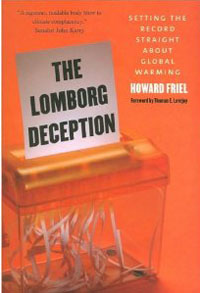Submitted by Larry Croft:
Book Review: The Lomborg Deception
by Sharon Begley
Newsweek
February 22, 2010
Debunking the claims of the climate-change skeptic.
 In naming roustabout, lumberjack, ironworker, and dairy farmer America’s “worst jobs,” CareerCast.com omitted one whose awfulness is counterbalanced only by its public-spiritedness: fact-checking Bjà¸rn Lomborg.
In naming roustabout, lumberjack, ironworker, and dairy farmer America’s “worst jobs,” CareerCast.com omitted one whose awfulness is counterbalanced only by its public-spiritedness: fact-checking Bjà¸rn Lomborg.
The Danish political scientist won fame and fans by arguing that many of the alarms sounded by environmental activists and scientists””that species are going extinct at a dangerous rate, that forests are disappearing, that climate change could be catastrophic””are bogus. A big reason Lomborg was taken seriously is that both of his books, The Skeptical Environmentalist
(in 2001) and <a href="http://www.amazon.com/gp/product/030738652X/ref=as_li_ss_tl?ie=UTF8&tag=pranks-20&linkCode=as2&camp=1789&creative=390957&creativeASIN=030738652X"Cool It (in 2007), have extensive references, giving a seemingly authoritative source for every one of his controversial assertions. So in a display of altruistic masochism that we should all be grateful for (just as we’re grateful that some people are willing to be dairy farmers), author Howard Friel has checked every single citation in Cool It. The result is Lomborg Deception
, which is being published by Yale University Press next month. It reveals that Lomborg’s work is “a mirage,” writes biologist Thomas Lovejoy in the foreword. “[I]t is a house of cards”¦Friel has used real scholarship to reveal the flimsy nature” of Lomborg’s work.
Friel’s previous books (The Record of the Paper: How The New York Times Misreports U.S. Foreign Policy and Israel-Palestine on Record) were works of media criticism, and that’s what he thought this one would be. He had planned to examine coverage of global warming in the Times and The Wall Street Journal, he told me, when he came upon Cool It. In this and his other writing, Lomborg accepts that greenhouse gases from the burning of coal, oil, or natural gas trap heat in the atmosphere and thus alter climate. But he doesn’t think it will be a disaster, which means we shouldn’t do anything too difficult or expensive to avert it. That has made him hugely influential in providing cover to politicians, climate-change deniers, and corporations that don’t want any part of controls on greenhouse emissions. Lomborg made that stance intellectually respectable in many circles, in no small part because his books seem so well sourced, something a number of glowing reviews noted. The Guardian named him “one of the 50 people who could save the planet” and Foreign Policy listed him as 14th on its list of “the top 100 public intellectuals.”
But when Friel began checking Lomborg’s sources, “I found problems,” he says. “As an experiment, I looked up one of his footnotes, found that it didn’t support what he said, and then did another, and kept going, finding the same pattern.” He therefore took on the Augean stables undertaking of checking every one of the hundreds of citations in Cool It. Friel’s conclusion, as per his book’s title, is that Lomborg is “a performance artist disguised as an academic.”
Read the rest of this article here.
